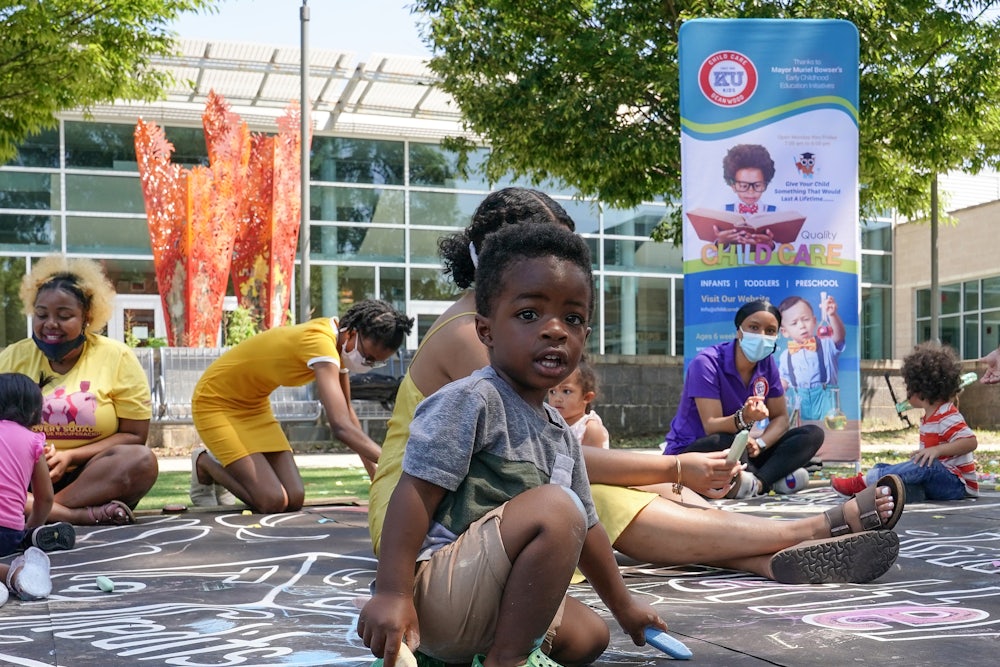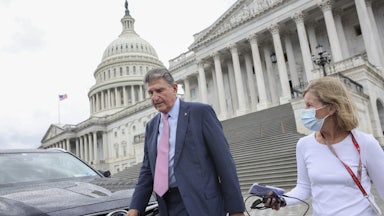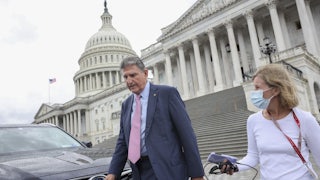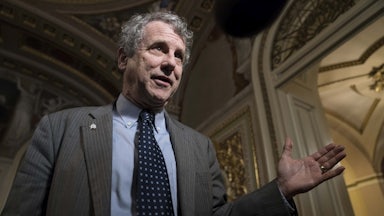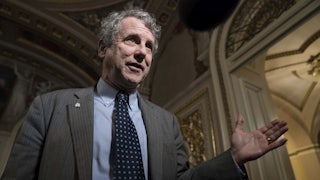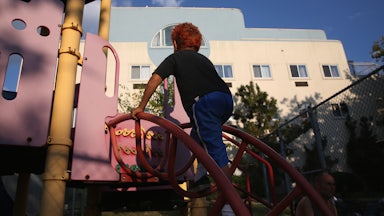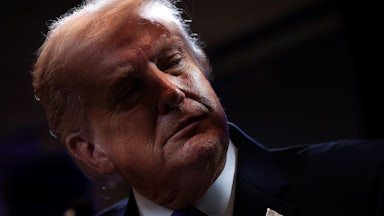Democrats are facing difficult choices as they pare down their reconciliation package. On Tuesday, reports surfaced that the party may be considering including funding for pre-Kindergarten while excluding funding for childcare, a scenario that appeals to West Virginia Senator Joe Manchin. This is alarming. Going down that path would put additional strain on a childcare system that is actively failing, and may leave families in worse shape than before. The idea, originally put forward by the centrist Progressive Policy Institute, must be considered a nonstarter.
First, a review of what is being proposed for pre-K and childcare in the package. The pre-K provisions would offer 3- and 4-year-olds universal free access, and would be delivered via schools, Head Start, and private childcare programs. Within seven years, most providers would be expected to hold a bachelor’s degree and to make an equivalent salary to elementary school teachers. For childcare—encompassing younger children and other nonschool arrangements—parent fees would be capped at 7 percent of income, with low- and moderate-income families paying much less. All childcare educators would receive a living wage, and states would put wage scales in place that move educators toward pay parity with their elementary school peers.
The simplest reason for not isolating pre-K is that doing so will cause the rest of the childcare sector—already spiraling badly—to implode. Most childcare programs balance their budgets with 4-year-olds because of financial pressures caused by (necessarily!) low adult-to-child ratios for infants and toddlers. In an average state like Virginia, one teacher can care for four infants but ten 4-year-olds; the infants therefore cost more than twice as much. Take away the 4-year-olds, and the budgetary math crashes. Research from universal pre-K initiatives in cities and states across the nation have borne out these real-world consequences. New York City’s pre-K program, for instance, led to 2,700 fewer childcare slots.
What’s more, given existing and horrendous staffing shortages, passing only pre-K would sabotage infant and toddler care in America. Think of it this way: What toddler teacher is going to stick around when she could work with 4-year-olds and make double the money? The implications of childcare closures go beyond the littlest children: Fully one-third of current childcare subsidies go to elementary-aged kids who utilize programs for before- and after-school care.
The question of after-school hours brings up the other gaping flaw in focusing just on pre-K: The programs would be aligned with the public school day and year. As any parent can tell you, jobs don’t operate on an 8:00 a.m. to 2:45 p.m., nine-month schedule. Given the more intensive care needs of younger children, letting the childcare sector disintegrate will create more headaches than relief for working parents. Childcare and pre-K policies must work in tandem; it’s more than hand in glove, it’s tendon and ligament.
This is why it’s so maddening to hear Manchin suggest that the party “pick one” among critical programs. Neither family policies nor family needs exist in a vacuum. As the National Women’s Law Center’s Melissa Boteach tweeted, “I am increasingly blown away by how divorced national policy discussions are from the reality of families’ lives. If my 4-year-old has pre-K, but I can’t find/afford care for my baby, I STILL CAN’T WORK. When lawmakers set up false choices, they leave families no choices at all.”
On a more philosophical level, it is simply incorrect to treat pre-K as a distinct entity that is severable from broader childcare questions. Pre-K is a form of childcare; the fact that it’s thought of on its own has more to do with a historical desire to detach from poorly regarded childcare programs than any rootedness in the science of child development. Early preschools were targeted at a middle-class clientele and pitched as “educational,” whereas early childcare programs were reluctantly set up as threadbare holding places for children of poor working mothers. Although today we know that any high-quality care setting can offer tremendous benefits for learning, the stigma of childcare—a field heavily staffed by women of color and immigrants—as being less-than has been hard to shake.
The wrongheadedness even extends to a misunderstanding of program benefits. Providing deeply subsidized childcare has been consistently shown to have an almost immediate economic return from parents—primarily mothers—flocking back to the workforce. As Bloomberg reported earlier this year, Quebec’s system (although it has some quality issues), “more than pays for itself through the increased tax revenue generated from more women working.” Cutting the policy that most reliably and swiftly recoups its costs defies all reason.
The good news is that House Speaker Nancy Pelosi seems to grasp the bigger context. In response to a reporter’s question on Tuesday, she said that “childcare and universal pre-K really go together, they are part of meeting the same need.” Still, the temptation to cleave the two is likely to remain, especially with pressure from Manchin.
There is little doubt that whatever cuts end up getting made to the Build Back Better plan are going to be painful; it turns out when you neglect social infrastructure for decades, it is tough to decide what to leave neglected. That said, paying only for pre-K is not a compromise so much as taking the car halfway up a hill and then letting it roll back down and loudly crash.
